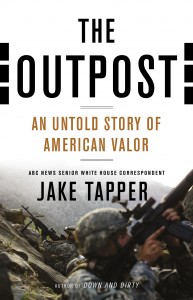 “In the modern media world and the modern American pop culture world, we know the names of Kardashians more than we know the names of U.S. troops who have been killed fighting a war, ostensibly for us.”
“In the modern media world and the modern American pop culture world, we know the names of Kardashians more than we know the names of U.S. troops who have been killed fighting a war, ostensibly for us.”
That’s one of the reasons that CNN anchor and Chief Washington Correspondent Jake Tapper wrote “The Outpost: An Untold Story of American Valor,” a book that has garnered praise from both liberals and conservatives.
In 2009, Tapper, then with ABC News, was in the hospital visiting his wife and their day-old son, Jack, when he saw a news report on the hospital TV about a combat outpost in Afghanistan that he’d never heard of. It was located at the bottom of three steep mountains near the Pakistan border. Fifty U.S. troops had fought off nearly 400 enemy forces, leaving eight Americans dead.
As Tapper explained to me on Christopher Closeup, “I was holding my son hearing about eight other sons, young men taken from this world. And it just started me on this journey to find out more.”
Originally, he intended to write only about this particular battle. But as other soldiers who’d served there heard about the book, they encouraged him to tell their stories as well. Tapper acknowledged, “Ultimately they made [the book] better because you get an entire history of one camp for the three-and-a-half years [it existed]. You see what the accomplishments are, what the failures are, who the men and women are that served there, who their families are, and the price that we pay.”
In fact, it was the opportunity to tell the human stories involved that motivated Tapper not only in regard to this book, but also in his career: “The reason I became a history major and not a government major in college is because I don’t care about the theory; I just want to know about the people.”
 One of the people that readers are introduced to in “The Outpost” is First Lieutenant Ben Keating, a devout Christian who has career aspirations of being a Senator or possibly even President some day. The reason Keating joined the Army is that he wants to know first-hand what it’s like to lead soldiers in battle in case he ever has the political responsibility to send young men and women into harm’s way.
One of the people that readers are introduced to in “The Outpost” is First Lieutenant Ben Keating, a devout Christian who has career aspirations of being a Senator or possibly even President some day. The reason Keating joined the Army is that he wants to know first-hand what it’s like to lead soldiers in battle in case he ever has the political responsibility to send young men and women into harm’s way.
Tapper said, “[Keating] is somebody who felt he learned more from his Christian Youth Fellowship Leadership training than from Army ROTC. He wanted to be a servant leader like Jesus. When he was a child reading the illustrated Bible, the idea of Jesus offering to wash the feet of His disciples was the be-all and end-all of leadership. It ended up resulting in a leadership style where he was absolutely beloved by the men under him – and he had a slightly prickly relationship with the men over him.”
Despite being surrounded by extreme violence and death, Ben Keating’s Christian faith was never shaken. Covering that much loss of life took an emotional toll on the author, however. Tapper said, “It’s made me less glib and flip as a person and a journalist. I think that having very brave men cry when they’re telling you their stories is a humbling experience. In general, I got to know these people through their loved ones and friends…I mourn for them even though I never met them.”
That mourning isn’t just for the dead, but the survivors as well. Tapper notes that we have hundreds of thousands of veterans who aren’t getting the care they need to deal with post-traumatic stress disorder and traumatic brain injuries. Part of the reason is the stigma attached to mental illness which prevents some veterans from seeking the help they need.
“Last year,” said Tapper, “more American service members died at their own hand than died in Afghanistan for the first time ever…I’m not enough of an expert on the policy in this to say what we need to do, but I can tell you without any question we’re not doing enough…I think it’s unsustainable how disconnected 98 or 99 percent of the population is from the people who serve for us. I’m not saying that we need a draft or that we need to raise taxes or that there needs to be some sort of national service requirement. But I don’t think it can continue the way it’s been.”
Writing “The Outpost” has also given Tapper a lower tolerance for pat answers from politicians, especially when it involves the loss of life in war-related stories or otherwise. Known for asking tough questions, Tapper recalled a recent exchange with President Obama at a White House press conference. It was in the aftermath of the Newtown, Connecticut school massacre, and Tapper noted that the President had said in 2007 that, if elected, he would reinstate the assault weapons ban.
Tapper explained, “Having no position on what needs to be done [because of journalistic objectivity] – whether there’s a gun component or a mental health component or school safety component, whatever it is – I asked a question that a lot of people thought was kind of edgy, [saying] ‘This is not the first massacre on your watch. Where’ve you been?’ And the President said…[the assault weapons ban] was one of the things he wanted to do…once getting elected, [but] he did nothing about it. Again, it’s not my proposed solution, but it’s what he said would help. And I said, ‘You didn’t do anything about it. Where’ve you been?’ I think a lot of people found the question edgy. The President certainly seemed to be among them. I think probably the loss of life in Connecticut, which is unbelievably horrifying, I think that probably made me less tolerant of politicians just saying, ‘Well, we need to do something.’ It’s been four years. And I think definitely when it comes to Afghanistan, I’ll be less inclined in the future to cover it in terms of the shallow, superficial coverage that I participated in when I was covering the President’s internal AfPak review: is it going to be 20,000 troops or 40,000 or 10,000? We’re about to have a whole discussion about how many troops should be in there in 2013, how many troops should be there after the U.S. combat presence leaves in December 2014. I think I’ll probably cover it differently than I covered a similar debate in 2009.”
As he gets set to launch his new CNN show, Tapper plans to continue that practice of holding politicians’ feet to the fire, “regardless of who they are or what my personal feelings are about them and whether or not I agree with things they’ve said…And I hope after my CNN show launches, people are able to say, ‘Yes, he was tough on John Boehner, but he was also tough on Joe Biden.’ I hope that the reputation will be that this is where serious, substantive, not mean, but assertive questions are asked.”
 Tapper also hopes that people who read “The Outpost” will be moved by it. He said, “If you are from a military family or you yourself have served, I hope that the book honors your service, honors your loved one’s service, and reflects an honorable but realistic description of what it is troops are doing, why they do it and who they are. If you are like me and you are not somebody who has an immediate connection to the military, I hope the book provides you with the same window that it provided me in writing it – which is understanding who these people are, being inspired by their selflessness, and making you appreciate how lucky we are to be in a country that has so many people who are so selfless. But also, [I hope it conveys] the gravity of sending people like this to dangerous places and the need to make sure that when we do it, we do it right and give them everything they need to accomplish their task and support them and their loved ones at home.”
Tapper also hopes that people who read “The Outpost” will be moved by it. He said, “If you are from a military family or you yourself have served, I hope that the book honors your service, honors your loved one’s service, and reflects an honorable but realistic description of what it is troops are doing, why they do it and who they are. If you are like me and you are not somebody who has an immediate connection to the military, I hope the book provides you with the same window that it provided me in writing it – which is understanding who these people are, being inspired by their selflessness, and making you appreciate how lucky we are to be in a country that has so many people who are so selfless. But also, [I hope it conveys] the gravity of sending people like this to dangerous places and the need to make sure that when we do it, we do it right and give them everything they need to accomplish their task and support them and their loved ones at home.”
To listen to my full interview with Jake Tapper, click the podcast link:
Christopher Closeup podcast – Guest: Jake Tapper
Read my review of “The Outpost” here.












